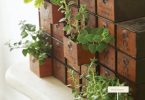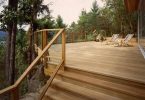 Text by Blair Korchinski
Text by Blair Korchinski
Required Tools
Shovel
Hand compactor or power tamper
Carpenter’s level
Scissors
Straight edge
Required Materials
¼ sand or ¾ down crushed limestone
Retaining wall stones
Flexible pond liner
Pond pump
Landscaping fabric
Fountains, streams, ponds and even waterfalls have become a common landscape feature. They look good and the soft burbling of the water is relaxing and pleasant. They seem complicated though—something that requires an experienced landscape architect and a crew of workers.
A simple solution is to build a fountain made from the same mortarless blocks used to build retaining walls. You can build a fountain to act as a centrepiece for your yard, make it part of a larger water feature, or build a series of them to add interest to a large yard. Since you are building the fountain, you can make it as high or as low as you like, and by choosing the blocks you use, you can determine what the circumference will be.
Step 1:
Dig a circular hole where you want your fountain to be. The hole should be deep enough to contain six to eight inches of ¾ down limestone and part of the first course of blocks. You will want about one inch of the first course below ground level for each eight inches your fountain is to be above ground, so the depth of the hole will vary slightly. The sides of the excavation should be as close to straight up and down as possible.
Step 2
Lay landscape fabric in the hole. This allows the earth to accept moisture so you get proper drainage and helps keep weeds from growing up through the base and poking out around the edges.
Step 3
Fill the hole with crushed limestone.
Once the sand or gravel is in the hole, screed it level using a straight 2×4 or other suitable straight edge. It is important that the base be level so that your retaining blocks don’t shift.
Pack the sand or gravel using a commercial vibrating packer, a hand-pulled packer, or a manual tamper.
This will provide a solid base while allowing excess water to drain when necessary.
Step 4
There is more than one kind of mortarless block on the market. Some are formed to fit tightly together and others use some sort of connector. While it is not important which you use, it is important that you let your retailer know what you are building so they can recommend the proper product for your project. You should be careful to follow the manufacturer’s instructions for joining the courses together.
Lay your first course of blocks. Start at one point and work in a circle checking the level of every block. If the first course is a little off, the problem is likely to worsen with each additional course.
The second course is laid on top of the first, with the second block covering half of each of the two blocks it is resting on. Be sure to check the level often.
Continue laying courses on top of each other until you reach the second to last course.
Step 5
Insert your liner. The liner is a thick, flexible material that is waterproof. Place it in the centre of the fountain so that it is in contact with the sand or gravel base and the sides of the fountain. Pull the edges of the material up and fold them over the top of the blocks you have already installed.
With the liner in place, install your last course of blocks over it. This will hold the liner in place.
Step 6
Install your pump. Simply place it in the bottom of the fountain and attach the plastic plumbing line to the desired height.
Run the cord from your pump up over the side of the fountain that will be the least conspicuous.
Step 7
Fill the fountain half to three quarters full with water and turn on the power.
Final Touches
Once your fountain is completed you may want to add some rocks to the bottom or some floating water plants. This will make your fountain more attractive and the water plants will help to keep the water clean. Choosing additions is up you; just be careful not to use anything with sharp edges that may cut the lining.
Latest posts by Canadian Home Trends (see all)
- Dining Room Design Tips - July 2, 2025
- Practical Luxury in Forest Grove - July 2, 2025
- The Hidden Value of Great Design - July 2, 2025






